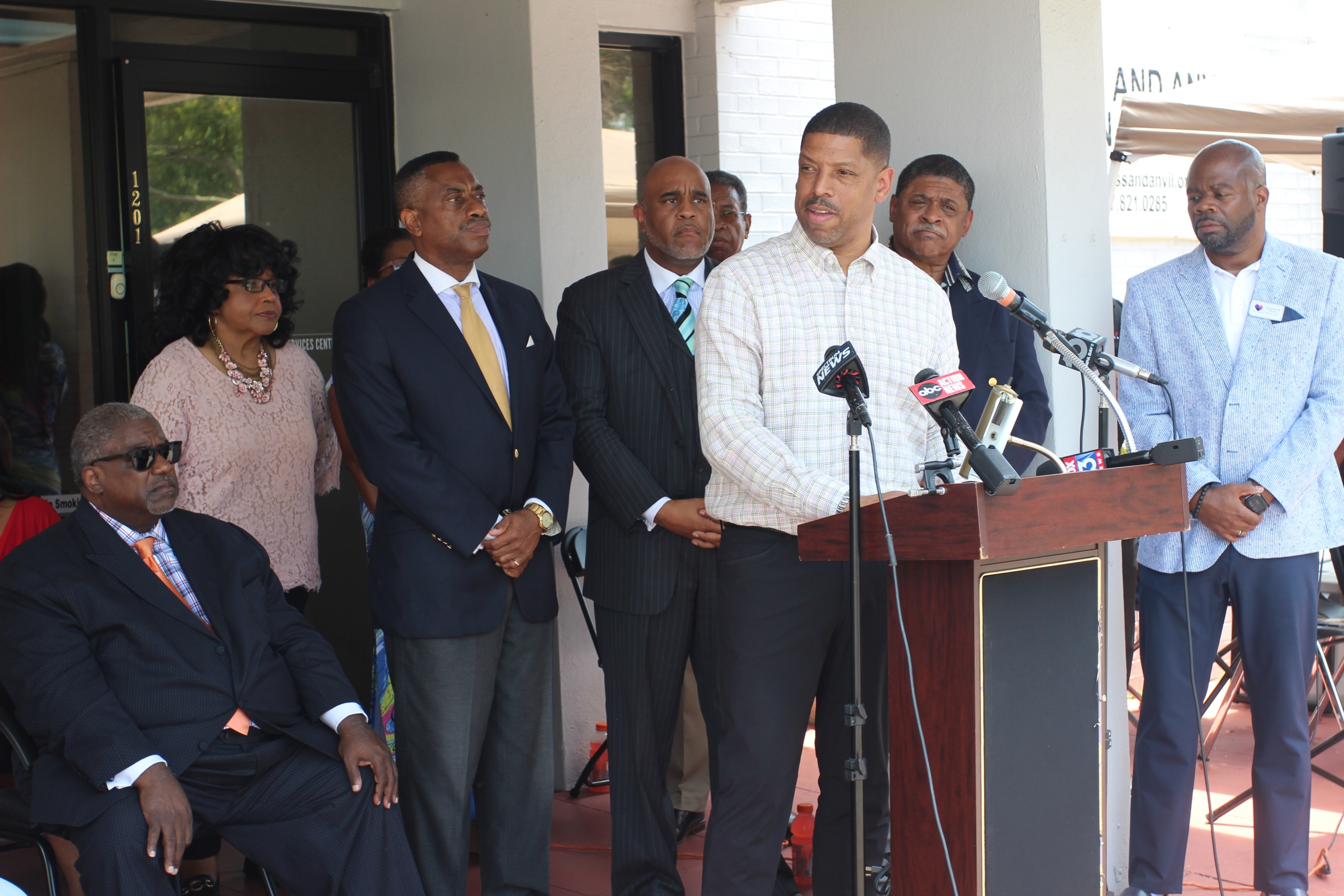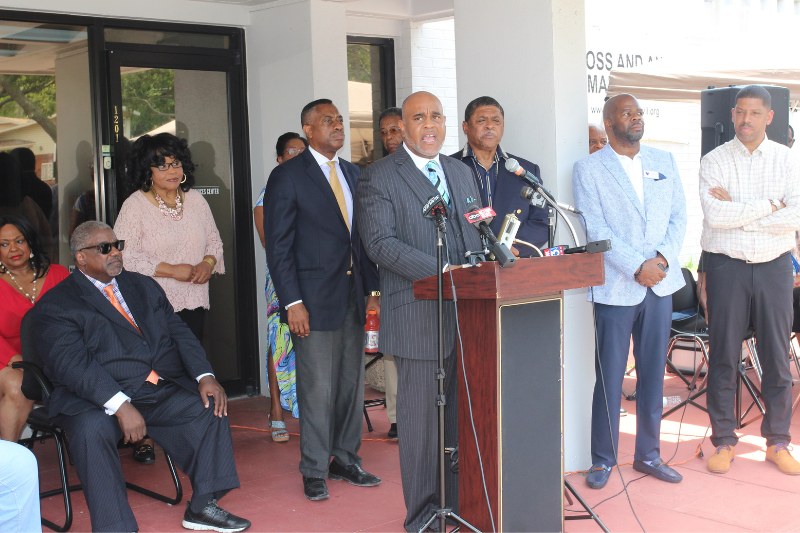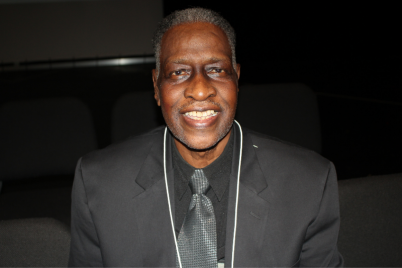After touring Sacramento, a group of pastors comprised a letter to Mayor Ken Welch giving him a summary outlining what they saw and that they ‘stand with his decision but encouraging him along with the city council to make the right choice in our estimation that choice is with Sugar Hill.’
BY FRANK DROUZAS, Staff Writer
ST. PETERSBURG — A group of local Black pastors officially announced their endorsement of the Sugar Hill Community Partners to redevelop the 86-acre Tropicana Field site. The clergymen gathered at Cross and Anvil Human Services on May 19 along with former NBA All-Star Kevin Johnson — former mayor of Sacramento and a current member of the Sugar Hill team — where Pastor Brian Brown noted that St. Pete is expanding and “starting to take on new shape.”
“Buildings are going up, and ground is turning over,” said Brown, senior pastor, St. Mark Missionary Baptist Church. “And while we’re excited about the many ways change is coming to our city, we are also equally concerned. We’re concerned because while there is progress for some and upward mobility for others, there are not change but chains that are holding sectors of our city behind.”
Brown said he hopes the redevelopment will make a positive impact on the community. The Sugar Hill group is a finalist to tackle the project along with Miami’s Midtown Development.
Former Mayor Rick Kriseman chose Midtown to complete the project at the end of his tenure; however, current Mayor Ken Welch, whose family lived in the Gas Plant neighborhood, said the final decision was his.
Redevelopment of the Tropicana Field site that destroyed the old Gas Plant neighborhood has been discussed for some time and is now beginning to come to fruition. Of the historic area, Pastor Wayne G. Thompson of First Baptist Institutional said the crux of the neighborhood was a vibrant community.

‘Yes, you have a beautiful beachfront, and yes, you have a lot of beautiful amenities in this community, but it’s the people that stood out for me,’ said former NBA All-Star Kevin Johnson, who is also the former mayor of Sacramento and a current member of the Sugar Hill team.
“It was the side of town to be and to be a part of,” he stressed, adding that with the redevelopment, the city will finally “live out its promise.”
Sugar Hill flew out some clergymen to Sacramento, and Johnson himself led them on a tour of the group’s projects. Pastor Clarence Williams of Greater Mt. Zion AME Church said he noticed many similarities between the African-American communities of St. Pete and California’s capital, including their downtown revitalization efforts.
“I’m just thankfully grateful that we have this opportunity to have a meaningful, progressive African American lead a project that will benefit this community,” he said. “This community deserves what we believe it will get — an opportunity to help repurpose and revitalize that area. And I would like to see it go down onto the Deuces!”
Pastor Frank Peterman of The Rock of Jesus Missionary Baptist Church said he had a chance to see a “wonderful redevelopment” of the African-American community during the trip to Sacramento. He praised Sugar Hill’s work in the Oak Park neighborhood and citywide and underscored the group is “more than qualified to redevelop this area.”
Bishop Manuel Sykes, senior pastor of Bethel Community Baptist Church, said downtown is rapidly expanding with housing units going up that are more and more difficult to afford, and praised Sugar Hill’s efforts to build affordable units in the historic neighborhood that was predominately Black.
“I’m happy that Kevin Johnson and his partner from JMA Construction are building this Sugar Hill opportunity,” he said. “The land that you’re standing on right now is land that was taken by any means necessary, and if something is not done, there will be a total eradication of both the present and the history of African Americans in this very spot.”
Mayor Ken Welch will decide on which company will undertake the project, and Brown said the collective of pastors had composed a letter to him outlining their reasons for backing Sugar Hill.
Johnson said that during his four or five trips to St. Pete in the past year, he was enamored by the people of the city.
“Yes, you have a beautiful beachfront, and yes, you have a lot of beautiful amenities in this community, but it’s the people that stood out for me.”
For the community of St. Pete to trust his group, its members would have to come out to Sacramento to see firsthand what Sugar Hill has accomplished in the past, Johnson explained.
“That was about trust,” he said. “You’ve heard every single speaker before me say, ‘There were promises made and promises unkept. Promises made, promises broken.’ So, for us, it’s about making good on what we say we’re going to do. and in order for that to be a reality, I wanted them to see what we’ve done in Sacramento.”
David Carlisle, project manager for Sugar Hill, said they will have affordable homes for sale and a certain amount of the capital pool that will be available to investors here locally if they want to participate in the deal, which is something that Sugar Hill has designed for this project.
Johnson noted the enormity and cost — $3 billion — of the undertaking and touted his group’s previous success stories, explaining that “nobody is going to invest in a project if we don’t have a track record of being successful.”
The project, Johnson said, “has to work for everyone as well as the African-American community,” pointing out that an important aim is to “create as many opportunities as we can for the community to invest and have equity in this project!”
Pastor Brown said the clergy collective was pleased that both Sugar Hill and Midtown Development talked about “brick and mortar” in their business plans but were more impressed with Sugar Hill’s investment in the “community, revitalization, and being progressive enough to look back and remember some things that may have been done wrong and then look forward to say, ‘how do we continue to bridge gaps between our communities but also how do we continue to remember the past in a way that is more honorable and respectful.'”











